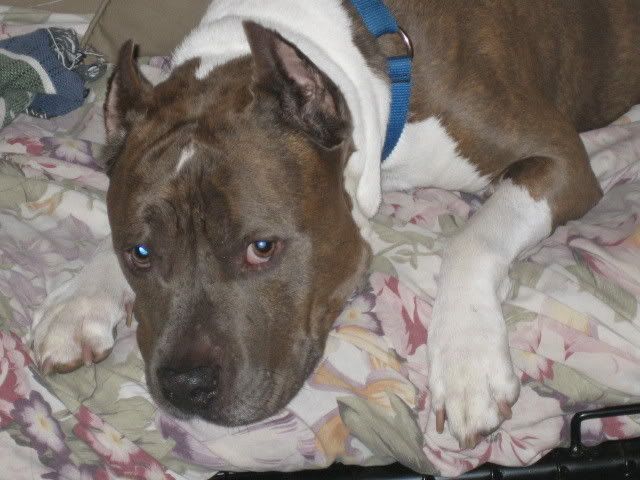Post by RealPitBull on Feb 11, 2015 8:35:54 GMT -5
Pit bull owners have at least one more year to get their pets spayed or neutered for free by the Sacramento SPCA.
The Sacramento Board of Supervisors voted Tuesday to allocate $20,000 to the “We Pay to Spay” program run by the Sacramento SPCA. “We Pay to Spay” offers free spay and neutering surgeries to owners of pit bulls and pit bull mixes, the breed of dog most often turned in to local shelters. An additional $10,000 was allocated to continue the SPCA’s services in the Galt, Herald and Franklin areas.
The agenda item was originally for the $20,000 allocation to the 14-year-old pit bull spay and neuter program, but Supervisor Don Nottoli suggested the extra $10,000 for spay and neuter programs for feral cats offered in his areas. It was approved unanimously by the board.
“My belief is that if we can sustain the effort, what we’re going to see over time is reduced numbers coming into the shelters,” Nottoli said. “We’re not going to get flooded with unwanted litters of puppies and we will have better outcomes for the animals that come into the system.”
The program costs $60,000 each year to run. Sacramento SPCA CEO Rick Johnson said in addition to the county money, the city pledged $10,000 to fund the program and the agency received significant individual donations.
“We have received a tremendous amount of local support recognizing the importance of this program,” Johnson said.
The animal rights agency was going to shut the program down at the end of January, citing budgetary issues. Johnson said the influx of cash from the county and the other sources will allow the program to continue through 2015. A large portion of the organization’s funding comes from private donations and grants.
“Certainly it has saved the program for this year,” Johnson said. “We’re going to continue pushing for the remainder of the year for (funding for) next year. The intent is to have sustainable funding so that each year we can operate this program.”
At any given time, Johnson said the county’s Bradshaw Shelter has 12 to 15 pit bulls up for adoption. Owners often relinquish pit bull litters to the shelter because they have trouble finding them homes. The breed is generally very strong and has a reputation for bullying.
“It’s a more challenging placement because these are generally bigger dogs,” he said.
A pit bull can have up to 12 puppies in a litter, he said. In comparison, German shepherds can have up to nine puppies and Labrador retrievers up to 10, according to the American Kennel Club.
“It can certainly be overwhelming to shelters because of the size of the litters,” Johnson said. Pit bulls are also the most frequently adopted dog, but that’s because of how many of them are available.
Over the course of the program, the Sacramento SPCA has spayed and neutered more than 11,000 pit bulls.
Read more here: www.sacbee.com/entertainment/living/pets/article9712517.html#storylink=cpy
The Sacramento Board of Supervisors voted Tuesday to allocate $20,000 to the “We Pay to Spay” program run by the Sacramento SPCA. “We Pay to Spay” offers free spay and neutering surgeries to owners of pit bulls and pit bull mixes, the breed of dog most often turned in to local shelters. An additional $10,000 was allocated to continue the SPCA’s services in the Galt, Herald and Franklin areas.
The agenda item was originally for the $20,000 allocation to the 14-year-old pit bull spay and neuter program, but Supervisor Don Nottoli suggested the extra $10,000 for spay and neuter programs for feral cats offered in his areas. It was approved unanimously by the board.
“My belief is that if we can sustain the effort, what we’re going to see over time is reduced numbers coming into the shelters,” Nottoli said. “We’re not going to get flooded with unwanted litters of puppies and we will have better outcomes for the animals that come into the system.”
The program costs $60,000 each year to run. Sacramento SPCA CEO Rick Johnson said in addition to the county money, the city pledged $10,000 to fund the program and the agency received significant individual donations.
“We have received a tremendous amount of local support recognizing the importance of this program,” Johnson said.
The animal rights agency was going to shut the program down at the end of January, citing budgetary issues. Johnson said the influx of cash from the county and the other sources will allow the program to continue through 2015. A large portion of the organization’s funding comes from private donations and grants.
“Certainly it has saved the program for this year,” Johnson said. “We’re going to continue pushing for the remainder of the year for (funding for) next year. The intent is to have sustainable funding so that each year we can operate this program.”
At any given time, Johnson said the county’s Bradshaw Shelter has 12 to 15 pit bulls up for adoption. Owners often relinquish pit bull litters to the shelter because they have trouble finding them homes. The breed is generally very strong and has a reputation for bullying.
“It’s a more challenging placement because these are generally bigger dogs,” he said.
A pit bull can have up to 12 puppies in a litter, he said. In comparison, German shepherds can have up to nine puppies and Labrador retrievers up to 10, according to the American Kennel Club.
“It can certainly be overwhelming to shelters because of the size of the litters,” Johnson said. Pit bulls are also the most frequently adopted dog, but that’s because of how many of them are available.
Over the course of the program, the Sacramento SPCA has spayed and neutered more than 11,000 pit bulls.
Read more here: www.sacbee.com/entertainment/living/pets/article9712517.html#storylink=cpy



 I look forward to learning much here
I look forward to learning much here